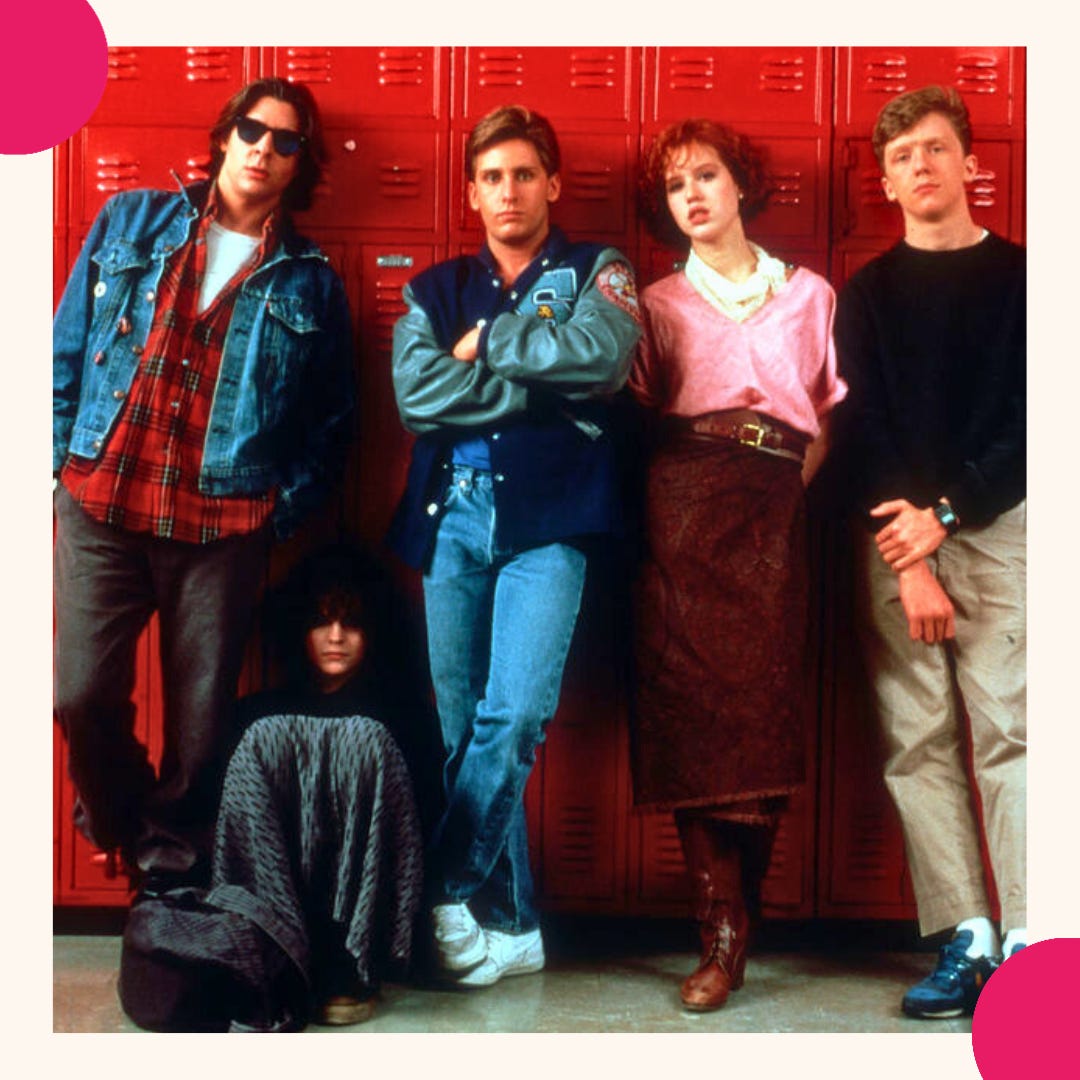Sounds Like Teen Spirit
my kids are both officially teenagers, and the thing that surprises me the most about this is…I don’t hate it!
As of last week, my kids are both officially teenagers, and the thing that surprises me the most about this is…
I don’t hate it!
Because teens are advertised as, ahem, quite challenging, I spent years dreading this phase and have been delighted to find that there is much to love about this age group. In our house, the middle school years were the most stressful—with the onset of puberty, social FOMO, and more demanding academic expectations—all at the same time.
I find the contradictions of this developmental stage fascinating: teenagers want to exert their independence and prove their superior critical thinking skills but still need regular snuggles. They regularly reveal glimpses of the adults they’re becoming, then revert to their little-kid ways: a nuanced debate over politics might be followed by a plaintive request to “help them” send an email to a teacher or boil an egg.
I love that their sleep schedule is the opposite of mine: when I go to bed early, I can rely on one of them to take the dogs out last thing; and when I get up early, I know I’ll be undisturbed for hours. Related: I do not miss the pre-crack-of-dawn pitter-patter of tiny feet on Christmas morning!
My friend Tina, a mom of two teen boys, “…loves their passion and optimism. They’re experiencing so many things for the first time that it’s fun to watch and relive through them. They get SO excited. And so dramatic :) very few moments are lived in the grey zone. They feel like they can do anything.”
I love having a family group text. Ours is unimaginatively called “Immediate Family” and this is where I am often introduced to their lingo, like mid, and the latest happenings on TikTok, which makes me feel like I’m (slightly) in the know and hip to the vibes…😎
And a compliment from an often cynical, world-weary teen is parenting GOLD. Jim and I hoard and treasure every tiny positive tidbit either of our children mutters, even if we’re not sure exactly what they mean. Recent examples: Teddy (13) told Jim I was a “power mom” and Sadie (17) said our Christmas tree was “fire.”
But the truth is: the wonderful aspects of the teenage years are balanced with some tricky parenting challenges, and so here are some tips for happily handling teens, from me and a few other wise women I know…
Let them know you’re on their side and want the best for them. I grew up in an “adults know best” environment, and it often felt suffocating, as if every grown-up’s mission in life was to enforce strict, nonsensical rules, and dictate how things should be, regardless of my feelings.
To allow for my kids’ growing independence, while recognizing their need for firm boundaries, an approach I’ve found helpful is showing them I respect their thoughts and feelings by treating difficult discussions as two-way conversations and asking for their perspectives before explaining my view. This has been effective for everything from sex and drugs to homework and screen time and lets kids know that while we, as parents, set the rules, we are doing it thoughtfully (while taking their feelings into account), and not reflexively.
My friend, Lindsay, the mother of two teen boys, has a note saved in her iPhone that eloquently expands on this philosophy so that she can re-read it regularly. The whole thing is reprinted below in case you’d also like to save it!1
Related: preserve your energy by picking your battles. Allowing your kids to get what they want from time to time builds their trust in you. I’ve decided that a teenager’s messy bedroom is not worth fighting over—and as long as there’s no food left lying around—I close the door and focus on other things.
Be firm, strong, and safe, like the edge of a swimming pool. Your teenager will push you away one minute, then cling to you the next. As my friend Becky, the mother of two teens, says, “…expect that your kids will be on an emotional rollercoaster and don’t ride it.”
Becky swears by Dr. Lisa Damour’s teen parenting books and advice; and one of the analogies about these years I’ve returned to repeatedly in difficult moments is from Damour’s book, Untangled:
“Like any good swimmer, they want to be out playing, diving, or splashing around in the water. And, like any good swimmer, they hold on to the edge of the pool to catch their breath after a rough lap or getting dunked too many times.”
As parents, to provide our kids with the strength and reassurance they need, we need to prioritize our own mental, physical, and emotional health.
Be the bad guy for your kids. My kids know that if they get into a sticky situation, they can use me as an “out.” When they were younger, they sometimes wanted to say no to a sleepover or social event but felt uncomfortable offending the host or explaining their feelings - instead, I gave my blessing to them saying they weren’t allowed to attend. As they’ve gotten older, both Sadie and Teddy know that if they get into a sticky situation, they can use me as their excuse (“My mom is super-strict and would kill me if she caught me…”) and can call me anytime, from anywhere, no questions asked.
Don’t talk about teenagers behind their backs (when they are anywhere nearby). I don’t know whether teens have exceptionally good hearing or are just highly attuned to their parents’ voices, but the number one thing my kids get mad at me about is when they overhear me talking about them to someone else - it’s disrespectful and undermines trust.
Related: both of my kids respond well to the right auditory inputs! Years ago, when Sadie was in a stormy mood, I noticed that she cheered up almost instantly if I turned on a particular playlist of throwback tunes; Teddy finds listening to audiobooks during car rides to and from school soothing.
Don’t ask how their day was. No one likes being asked whether they “had a good day” because it feels loaded. Instead, casually ask something low stakes like who they sat next to at lunch, or what they ate. They’ll answer matter-of-factly and, then will often tell you all the things you really want to know…I learned this trick during a parenting class when my kids were in preschool, and it continues to work.
Car rides are when you’ll hear all about it. Tina advises: “Have all 'talks' in the car so that you’re not looking right at each other in an intense manner. I don’t know why it works—maybe it’s because there’s an end to the journey, and it feels less like 'oh shit mom wants to talk!'"Grip the steering wheel, stare straight ahead, and allow them to tell you what’s on their mind…
Their plans will change—constantly. Teenagers have always been impulsive, but before cell phones, we generally made plans and stuck to them; I envy this about anyone who raised teens in bygone days! It’s taken me years to learn that the elaborate plan to travel a long distance to a party discussed ad nauseam on Monday will likely turn into a completely different activity a few days later. I no longer invest any time or energy in organizing logistics until 12 hours before any given social event.
Having teens in the house brings back memories of my own teenage years: I was a studious nerd, like Anthony Michael Hall’s character in The Breakfast Club, but desperately wanted to be a party girl, like Molly Ringwald’s character—or my ultimate idol: Sloane Peterson in Ferris Bueller’s Day Off.
Just for fun: who were you most like in high school…or who did you want to be? Take the poll below or leave a comment!
In Case You Missed It: 99 Things Money Can’t Buy // A Guide To The Year’s TikTok Drama // Mars Needs Insects?! (NY Times gift link) // Dreamy Christmas decorations // Spotify Wrapped is fascinating // This holiday-themed commercial from 2018 holds up (and makes me teary!) // These are this year’s 10 best books, says the NY Times (NY Times gift link) // A Genius teen Advent Calendar //
Thank you for reading and have a wonderful weekend! ❤️If you like Some Happy Scribbles, click the ❤️ button at the top or bottom of this newsletter so more people can discover it!
The teenage years have a lot in common with the terrible twos. During both stages our kids are doing exciting new things, but they’re also pushing boundaries (and buttons) and throwing tantrums. The major developmental task facing both age groups is also the same: kids must pull away from parents and begin to assert their own independence. No wonder they sometimes act as if they think they’re the center of the universe. This makes for complicated parenting, especially because teens are beginning to make decisions about things that that have real consequence, like school and friends and driving, not to speak of substance use and sex. But they aren’t good at regulating their emotions yet, so teens are prone to taking risks and making impulsive decisions. This means that having a healthy and trusting parent-child relationship during the teenage years is more important than ever. Staying close isn’t easy, though. Teens often aren’t very gracious when they are rejecting what they perceive to be parental interference. While they’re an open book to their friends, who they talk to constantly via text messages and social media, they might become mute when asked by mom how their day went. A request that seemed reasonable to dad may be received as a grievous outrage. If this sounds familiar, take a deep breath and remind yourself that your child is going through his terrible teens. It is a phase that will pass, and your job as parent is still vitally important, only the role may have changed slightly. Here are some tips for navigating the new terrain: 1. Listen. If you are curious about what’s going on in your teen’s life, asking direct questions might not be as effective as simply sitting back and listening. Kids are more likely to be open with their parents if they don’t feel pressured to share information. Remember even an offhand comment about something that happened during the day is her way of reaching out, and you’re likely to hear more if you stay open and interested — but not prying. 2. Validate their feelings. It is often our tendency to try to solve problems for our kids, or downplay their disappointments. But saying something like “She wasn’t right for you anyway” after a romantic disappointment can feel dismissive. Instead, show kids that you understand and empathize by reflecting the comment back: “Wow, that does sound difficult.” 3. Show trust. Teens want to be taken seriously, especially by their parents. Look for ways to show that you trust your teen. Asking him for a favor shows that you rely on him. Volunteering a privilege shows that you think he can handle it. Letting your kid know you have faith in him will boost his confidence and make him more likely to rise to the occasion. 4. Don’t be a dictator. You still get to set the rules, but be ready to explain them. While pushing the boundaries is natural for teenagers, hearing your thoughtful explanation about why parties on school nights aren’t allowed will make the rule seem more reasonable. 5. Give praise. Parents tend to praise children more when they are younger, but adolescents need the self-esteem boost just as much. Teenagers might act like they’re too cool to care about what their parents think, but the truth is they still want your approval. Also looking for opportunities to be positive and encouraging is good for the relationship, especially when it is feeling strained. 6. Control your emotions. It’s easy for your temper to flare when your teen is being rude, but don’t respond in kind. Remember that you’re the adult and he is less able to control his emotions or think logically when he’s upset. Count to ten or take some deep breaths before responding. If you’re both too upset to talk, hit pause until you’ve had a chance to calm down. 7. Do things together. Talking isn’t the only way to communicate, and during these years it’s great if you can spend time doing things you both enjoy, whether it’s cooking or hiking or going to the movies, without talking about anything personal. It’s important for kids to know that they can be in proximity to you, and share positive experiences, without having to worry that you will pop intrusive questions or call them on the carpet for something. 8. Share regular meals. Sitting down to eat a meal together as a family is another great way to stay close. Dinner conversations give every member of the family a chance to check in and talk casually about sports or television or politics. Kids who feel comfortable talking to parents about everyday things are likely to be more open when harder things come up, too. One rule: no phones allowed. 9. Be observant. It’s normal for kids to go through some changes as they mature, but pay attention if you notice changes to her mood, behavior, energy level, or appetite. Likewise, take note if he stops wanting to do things that used to make him happy, or if you notice him isolating himself. If you see a change in your teen’s daily ability to function, ask her about it and be supportive (without being judgmental). She may need your help and it could be a sign she needs to talk to a mental health professional.








You sound like such an incredible mom! I’m in such awe at how my son has changed and how the early stages of a relationship have evolved in just the first 14 months — I can only imagine what that will be like in 14 years. Thanks so much for sharing 💛 (bookmarking for my future self)
Also, I loved Trust too! Such a unique read!
Amelia, I also loved Trust and felt intimidated to dip in, but it was so rewarding. Why do we get nervous around books sometimes?